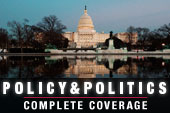Republicans gathered en masse outside D.C. to talk about their future, but much of the focus of speeches Friday at the Conservative Political Action Conference was on the past.
Senate Minority Leader Mitch McConnell, R-Ky., walked on stage with a stack of paper tall enough to get drafted into the NBA. The 20,000 sheafs were rules and regulations attached to Obamacare, the 2010 law designed to extend near-universal health insurance coverage whose implementation the GOP claims will unleash economic chaos.

“This law is a disaster,” McConnell said, shortly after his caucus tried unsuccessfully this week to defund this measure. “Anyone who thinks we’ve moved beyond is dead wrong. Obamacare should be repealed root and branch. And I want to let you know that we’re not backing down from this fight.”
RELATED: How the South Is Bringing Down the Grand Old Party
But if Republicans are still stuck in 2010, McConnell argued that in an iPad age the Democrats are trapped in an era of Studebakers and Harry Truman. “It may not seem like it now, but we’re actually winning,” the Kentuckian said, noting that the GOP has a slate of young firebrands for the presidential stage, such as Florida Sen. Marco Rubio and Rand Paul, the junior senator from the Bluegrass State.
Paul came as close as anyone to electrifying CPAC with this Thursday speech. His libertarian message was one of not just smaller government at home, but a less extravagant national security agenda abroad. “The GOP of old has grown stale and moss-covered,” said Paul, whose father is former presidential candidate and retired Texas Rep. Ron Paul.
But the speeches largely reflected that it is easier to talk about a way forward than actually show what the path looks like. President Obama cruised to re-election last year, while a majority of the public views the House Republican majority as out of touch and extremist, according to a recent poll by the Pew Research Center and regular approval surveys over the past two years.
CPAC speakers could easily rally their crowd by taking pot shots at Obama, yet they struggled to offer an economic vision that goes beyond platitudes or a rehash of Ronald Reagan’s supply side theories of more than three decades ago.
The crowd got conflicted advice from their biggest names.
McConnell declared it was time to “punch back” and that Republicans stop any introspection that comes with being the crybaby caucus.
Real estate developer Donald Trump argued that the party has a losing hand, particularly if it tries to reform entitlement programs such as Medicare and Social Security.
House Budget Chairman Paul Ryan, R-Wisc., said putting limit on entitlement spending was necessary to start paying down the $16.5 trillion national debt. “It’s clear we have to fix entitlements, we have to grow our economy,” Ryan said in a Friday speech, after having proposed a budget this week that would turn Medicare into voucher-style health coverage for Americans under the age of 55, a policy that has pushed for the better part of two years.
Interestingly, it was the media savvy (but electoral naif) Trump noted who best articulated the tension between conservative policies and electoral appeal for the GOP.
Cutting Medicare and Social Security is unpopular with Republican voters, including the Tea Party faithful, the Manhattanite explained. The TV host said granting citizenship to 11 million undocumented workers was a “suicide mission,” since they would all vote Democratic.
The Donald said that left the GOP with the need to push policies that fuel economic growth in order to restore the government to financial health. He portrayed renovations to the economy as being as simple as rehabbing a luxury golf club in Florida.
Some of the policies he articulated for a renaissance were not incredibly controversial.
His call for bringing manufacturing jobs back from Asia is uncontroversial, since Obama has also endorsed the idea and Republican presidential nominee Mitt Romney campaigned heavily on the idea last year. The Donald’s push to extract more oil and natural gas from the country’s shale reserves is controversial with environmentalists, but that also is a difference of degrees with many Democrats.
But then, the Donald, to applause, suggested the United States should use oil from Iraq to cover the expenses of our 2003 invasion and resulting war to oust Saddam Hussein.
“$1.5 trillion,” Trump said of Iraq’s oil reserves. “We should take it and pay ourselves back. What the hell are we thinking?”




